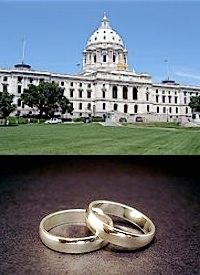
On May 21 the Minnesota House of Representatives passed a proposed state constitutional amendment that would define marriage as only between a man and a woman. The House vote followed similar approval of the measure in the Senate on May 11, which means that the proposed amendment will be placed on the state ballot for Minnesota voters to decide in November 2012. If passed it will make Minnesota one of more than 30 states that have actively protected traditional marriage via their state constitutions.
The 70 to 62 House vote stuck mostly to partly lines, although four Republican lawmakers voted against the amendment and two Democrats voted in favor of it. “State law already prohibits gay marriage,” reported the Associated Press, “but supporters of the proposed amendment said it is necessary to prevent judges or lawmakers from legalizing it in the future.”
Passage of the bill was preceded by several hours of emotional debate from individuals on both sides of the issue, including Democratic State Representative Karen Clark, who described how she and her lesbian partner had considered traveling to Iowa, where same-sex “marriage” is legal, so her ailing father could witness the event. “Please don’t make me go off to Iowa,’’ she pleaded with her fellow legislators. “I was raised in Minnesota. I’m a child of Minnesota.” Hours later she called passage of the proposed amendment “a sad day for Minnesota.”
Democratic Representative Steve Simon complained that the amendment represented an “ill-advised attempt to use our constitution to place an important question out of reach of the elected officials and to impose our will in the year 2011 on future generations 100, 200, 300 or more years from now.”
But Republican Representative Steve Gottwalt, a key lawmaker in passage of the amendment, said the measure “is not about hatred, it is not about discrimination or intolerance. I have faith we as Minnesotans can have a reasonable dialogue on this issue characterized by respect and decency and allow the people of Minnesota to decide.”
Jason Adkins of the Minnesota Catholic Conference added that putting the amendment on the ballot for voters means that “Minnesotans have been given the opportunity to have an important conversation about the future of marriage.”
Tom Prichard of the Minnesota Family Council, which has been at the forefront of the battle to protect marriage for the past several years, thanked both the House and the Senate for voting to allow the people of Minnesota to make the final decision on how marriage should be defined, “just like voters have done in 31 other states.” Prichard noted that the institution of marriage “predates government and has served as the foundation of society for thousands of years. If marriage is to be redefined, it should only be society, speaking through the electorate, who makes this decision — not judges or legislators.”
The next 18 months will be crucial as homosexual activists pull out all the stops to ensure the amendment does not pass, while pro-family forces put forth their own diligent efforts —along with plenty of prayer — to protect what they argue is a foundational building block of sane and civil society.
Groups like OutFront Minnesota, the Human Rights Campaign, and other homosexual activist organizations have joined forces under the banner of Minnesotans United for All Families in an effort to defeat the amendment. “This is Day One of a campaign that’ll last 18 months,” Donald McFarland, project manager for the Minnesotans United campaign, told the St. Paul Pioneer Press newspaper after passage of the amendment. “We’re working around the clock to build this campaign. There are a lot of people who are outraged about this.”
Joe Solmonese of the Human Rights Campaign added that “at a time when all Minnesota families are sharing concerns over the economy, it is appalling that the legislature would seek to harm a segment of those families rather than pass a budget. We are confident, however, that when November 2012 arrives, Minnesotans will reject these divisive tactics.”
But Brian Brown, president of the pro-family National Organization for Marriage, called the vote in the Minnesota legislature another in a “string of stinging defeats” for homosexual activists and evidence that the legalization of same-sex marriage is far from inevitable, as groups like the Human Rights Campaign insist.
“No state in this nation has embraced same-sex marriage since 2009, and many have explicitly rejected it,” he said, pointing to its defeat in New York, New Jersey, and Maine, and to the decision by Iowa voters to throw three state supreme court justices off the bench after they voted to impose same-sex marriage on the state last year. Noting that two traditionally liberal states, Maryland and Rhode Island, rejected homosexual marriage earlier this year, Brown said that now Minnesota, “another liberal state, is on the path to enact a marriage amendment. We hope that the media will start to pay attention at what the American people are doing through their actions — they are rejecting same-sex marriage in droves.”
In the run-up to the 2012 ballot initiative, Brown anticipated “a thorough, respectful, discussion with the voters of Minnesota on all the reasons why the definition of marriage should be preserved as the union of a man and a woman, and to explain the risks to Minnesotans if they allow an activist judge or liberal legislators to redefine marriage in the future without public approval.”
He said that, like other pro-family leaders in the state, he was confident “that voters in Minnesota will vote to adopt the marriage amendment preserving traditional marriage against judicial and legislative activism, just as voters in 30 other states have done.”



